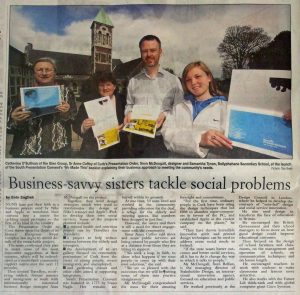Inside a run-down convent in Cork, a community of nuns, Travellers, recent immigrants, ex-offenders, recovering addicts, old and young came together to visualise and prototype a whole raft of future social services. This is what the Irish Examiner made of their story.

Nuns have put their faith in a business process used by Nike and Apple to transform their convent into a centre for tackling social problems – the first of its kind in the country.
The Presentation Order in Cork threw open the doors of its historic Evergreen Street complex last night to unveil details of the remarkable project.
The nuns confirmed they planned to enact some of the most innovative suggestions at their convent, which will be redeveloped as a multi-faith community support centre over the next 12 months.
They invited Travellers, recovering addicts, former inmates and immigrants to work with internationally renowned business design strategist Sean McDougall on the project.
Together, they used design strategies that were used to revolutionise the design of Nike’s trainers and Apple’s iPod to develop their own social services. Some of the projects planned include:
- a mental health and nutrition project run by Travellers for Travellers
- a project to help reduce tensions between the elderly and teenagers
- the development of an art gallery focused on community perceptions of Cork from the views of young people, recent immigrants and the unemployed
- and gardening classes and other clubs aimed at supporting integration
South Presentation convent was founded in 1775 by Nano Nagle. Her remains are buried within its grounds.
At one time, 50 nuns lived and worked in the community, providing education for the deaf, a refuge for the elderly and meeting spaces. But numbers have dropped to just five.
However, the sisters said there is still a need for direct engagement with the community.
Sister Anne Coffey said more and more services were being created by people who live at a distance from those they are trying to support.
“We took a leap, in faith, to show what happens if you put your trust in people to come up with their own solutions,” she said.
“We are so pleased with the outcomes that we will be putting some of the findings into practice straight away.”
Mr McDougall congratulated the nuns for their amazing foresight and commitment.
“For the first time, ordinary people in Cork have been using the design techniques that led IBM to abandon super-computers in favour of the PC, and established Apple as the coolest company on the planet,” he said.
“They have shown incredible innovative spirit and proved design techniques can be used to address issues of acute social need in Ireland.”
“If the state wants better outcomes and better social services, all it has to do is change the way in which it talks to people.”
Mr McDougall, from Belfast, is Managing Director of Stakeholder Design, and international innovation agency focused on education and the public services.
He worked previously at the Design Council in London, where he helped to develop the concepts of ‘user-led’ design and social service innovation.
He also used design to transform the face of education in Britain.
He encouraged the British Government and their school managers to focus more on how good design could improve educational outcomes.
They focused on the design of school furniture and classrooms, on the management and operation of schools, on communication techniques and on lesson length.
He encouraged teachers to work with students to make classrooms and lessons more attractive.
He also works with the Futurelab think tank and with global computer giant Cisco Systems.
We are presently planning to launch sister projects in six European countries. If you would like to be involved, please get in touch.
Download the stage one report: We Made This
Original article published in the Irish Examiner. Thenks to Des for allowing use of the picture.